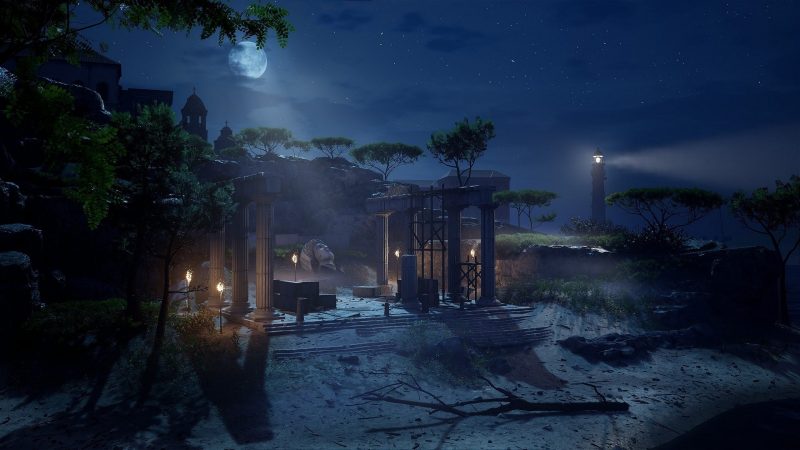Sherlock Holmes – The Game is Finally Afoot
PC, Xbox Series/One, PS4/5
To date, there have been eight games in the main Sherlock Holmes adventure series. With each one, in my mind, the series makes a slight improvement, and I’ve always (sort of) joked that if they keep following this pattern for a few more years, logic follows that eventually there will be a Sherlock Holmes game that is very, very good. So when Sherlock Holmes Chapter One, now the ninth instalment in Frogwares’ long-running series, was put on my radar, I expected that it would be some improvement on its predecessor, but my hopes weren’t too high. “We’re a few years off, Jess,” I said to myself. “One day you will get to solve crimes and it will bring you the joy you’re looking for, but it isn’t time yet”. But good news, everyone. The time has finally come. I’m happy to report that the trajectory continues as expected, and while this isn’t by any means a perfect game, it is a very good one. As it turns out, all this series needed to succeed was an open world and a game that largely left me to my own moral devices.
I love playing detective. Ask me to do any kind of investigation, no matter how minor, and I will be murder-board levels of extra about it, not stopping until I have uncovered every detail. It’s why my day job is as a researcher. So Sherlock Holmes, widely considered one of the greatest detectives in the world (look, it’s controversial, we could debate that all day) is an attractive (not in a physical way) protagonist for me. In this case, he is actually an attractive protagonist in the physical sense, because Chapter One puts us into the shoes of the consulting detective at the beginning of his career when he is apparently at inexplicably high levels of thirst trap. But the real drawcard is his mind. He sees things that others don’t, is able to make impressive logical leaps, and essentially stores a variety of mental murder boards in his brain at all times. He’s also often a huge asshole, but we’ll get to how the game mediates that in a minute. The most important thing about this game is that it’s the first time I have really felt like Sherlock Holmes, not just like I’m constantly trying to play catch up with him. He’s such a well-known character, and yet here I feel like we’re finally getting to actually know him – and in a way that makes him far more human.
Sherlock Holmes Chapter One is set on the isle of Cordona, where our strapping young protagonist has returned to try and gain some closure around the death of his mother many years before. His older brother Mycroft, as is usually the case, thinks this is a terrible idea and implores him to stay away, but Sherlock (who rarely heeds anyone’s warnings) perseveres. Instead of closure, he quickly uncovers a web of questions and begins unravelling an intriguing mystery that forces him to not only look into the current state of affairs on Cordona, but to delve into his memories of the past with the help of his friend Jon (not Watson, just Jon), and re-examine the circumstances of his mother’s death from a new perspective.
Of course, while that’s his main purpose for being on Cordona, it isn’t the only mystery Sherlock is trying to solve. There are plenty of cases (or even a passing mini-mystery) to be picked up and pursued across the island, whether they be given to you by the fairly inept police of the area, assigned by Mycroft, or just obtained by overhearing a conversation that piques the detective’s interest. The main questline itself isn’t too long, but you can spend hours and hours picking up new side cases in this open-world and pursuing those instead, ignoring your deeply repressed family issues in the name of pursuing other kinds of justice instead. The open world lends itself well to exploration, with new side cases seemingly becoming available right when you are likely to want a break from the main case, and for me, it was almost addictive. You can always see where there are clues left to collect, or where an unvisited place of interest is on your map (as marked by you), so there’s always some kind of hint telling you where you might want to go next to progress some kind of investigation. Sometimes it just takes you a moment to notice it.
Because this game doesn’t exactly hold your hand. Making a logical deduction in your ‘mind palace’ requires the collection of evidence (the only thing Sherlock trusts) and gathering evidence requires every tool in Sherlock’s arsenal. Some evidence will need to be presented to the right person, some will require chemical analysis in the form of an almost mathematical minigame, and some requires a check of the archives at the local police station, city hall or the ‘Cordona Chronicle’ – the local newspaper – in order to take full advantage of the clues it gives you. Each piece of evidence has a marker to tell you what you need to do with it, but there’s usually an extra step of deduction involved. Which archive do you need to check to find the info? Which person will need to see this evidence? What kind of appearance might you need to be sporting in order to even get that person to talk to you? While I often found myself a little stumped as to what I might be doing next, I usually had some kind of vague idea of what I was aiming for. It was just on me to correctly deduce both the next step, and then ultimately, the right conclusion to my cases.
Interestingly, when I say the ‘right’ conclusion here, I mostly mean the conclusion that feels the most correct to me. Not only does this game not hold your hand when it comes to gathering evidence, but it doesn’t really work on ‘right’ or ‘wrong’, instead focusing more on ‘What conclusion can you justify?’ and ‘Can you morally live with the consequences?’. To me, those questions are so much more interesting. At the beginning of the game, there’s a disclaimer, which tells me that this game is attempting to provide a semi-accurate recreation of society at the time the game is set, so there are some values and attitudes being portrayed that were wrong then, and wrong now. Immediately, red flags went off in my mind. I’m not really interested in reliving those terrible historical attitudes, more on correcting them, especially if a game is going to force me to perpetuate them. But, much to my surprise, it kind of… didn’t.
There were a number of cases that allowed me to follow the evidence to a conclusion, and then follow my heart in deciding what to do with that information. I wasn’t forced to turn people into the police that I didn’t want to, and where I thought justice would better be served by letting the truth go ‘undiscovered’, that was a totally valid conclusion to reach. Sometimes my friend Jon, who wrote notes in his diary about every single move Sherlock and I made throughout the game, often agreed with my somewhat radical or subversive choices. “Fuck the police and the traditional justice system, Jon,”, I confidently decided, and he just… backed me up.
So Sherlock, the way I played him, ended up a character with values more closely aligned to mine. I didn’t expect that. He’s still arrogant, of course, though less so given he’s portrayed here at the beginning of his career as a consulting detective. But for me, he was also kind of a feminist, and his heart was just that little bit bigger. His story played out the way that made the most sense to me, and the game was fine with that, even going so far as to justify my conclusions – whatever I found them to be. That was definitely missing from previous entries in the series, and was a welcome change.
Some frustrating mechanics do stop this game from being perfect. There’s a fight mechanic that you usually need to employ in order to take on warehouses full of goons, all of which feel just a little too long and not overly rewarding. You don’t earn much from them, and they just aren’t that fun – or at least, they weren’t for me. There’s also a fair chunk of the game that’s focused on a mechanic that asks you to mentally recreate crime scenes as they played out, and if you really don’t have a firm grasp on how the crime occurred, they can be long and painful scenes to navigate. There can be a lot of trial and error involved, and while the game does allow you to skip a lot of things if they aren’t your jam (like combat, or chemical analysis), there’s no choice but to muscle through these crime reconstructions. Sometimes they’re interesting, but mostly, they just get in the way.
This isn’t the perfect Sherlock Holmes game. Maybe that doesn’t exist. But for me, this is easily the best one that currently exists, and I still believe that the series is on an upward trajectory. If future titles use this one as inspiration, I think they’ll go far – maybe with less of the uncomfortable societal ‘norms’, if I’m making suggestions. This version of Sherlock feels human, his methods of deduction are satisfying, and his cases are certainly intriguing enough to make aspiring detectives want to solve them all. I thoroughly enjoyed my time with Sherlock Holmes Chapter One, and am thrilled that it exceeded my expectations. And if Frogwares wanted to keep making open world detective games… I would be more than okay with that.
Sherlock Holmes Chapter One was reviewed on the PS5 with code kindly supplied by the publisher.
























